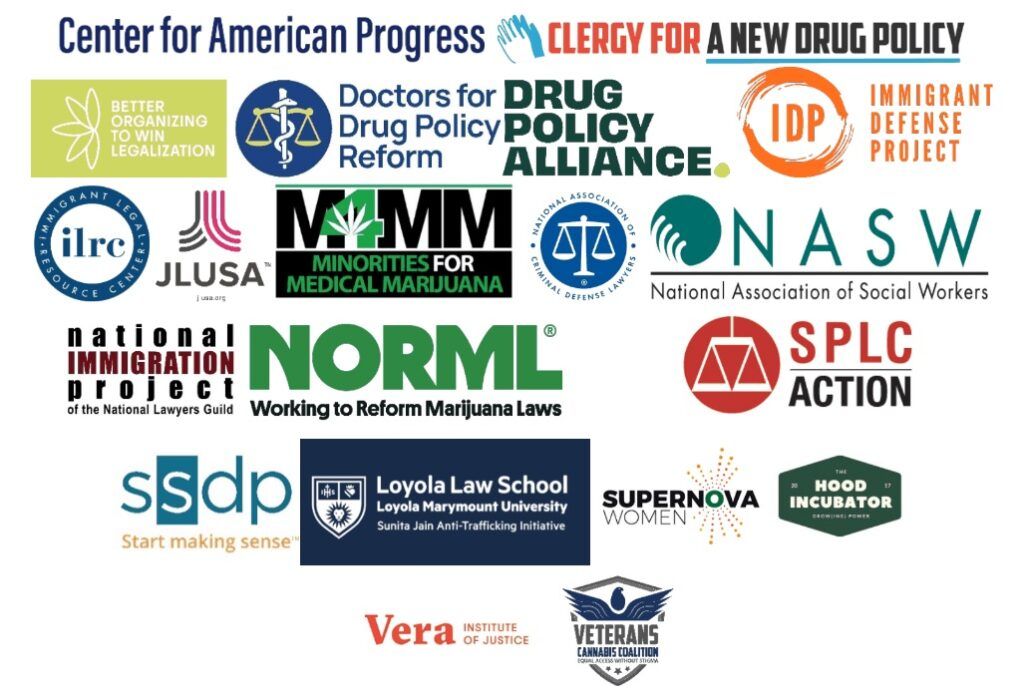A coalition of 20 advocacy groups, calling themselves the Marijuana Justice Coalition, has sent a letter to President Biden and Vice President Harris urging them to support fully descheduling, and not simply rescheduling, marijuana.

A collage of every group that’s part of the Marijuana Justice Coalition.
The letter is signed by a variety of reform groups, including the Center for American Progress, Doctors for Drug Policy Reform, Drug Policy Alliance, Immigrant Defense Project, Immigrant Legal Resource Center (ILRC), National Association of Criminal Defense Lawyers, National Association of Social Workers, National Immigration Project, National Organization for the Reform of Marijuana Laws (NORML), Southern Poverty Law Center, Students for Sensible Drug Policy (SSDP) and many others.
“The Marijuana Justice Coalition (“MJC”) writes to thank you for your initial steps toward reforming federal marijuana policy, as you mentioned in your recent State of the Union address”, begins the letter. “In order to fulfill that pledge, the MJC urges you to publicly support the removal (“descheduling”) of marijuana from the Controlled Substances Act (CSA). Only the descheduling of marijuana will truly decriminalize it at the federal level.”
The remainder of the coalition’s letter can be found below:
As you have acknowledged, the criminalization of marijuana has been particularly devastating to Black and brown communities. The ACLU has reported that Black people are arrested at four times the rate of whites despite similar rates of marijuana usage. A 2023 report by the U.S Sentencing Commission found Black and Latino individuals make up over 85% of those sentenced with federal marijuana-related charges, despite using marijuana at similar rates as white individuals. It is a moral imperative that marijuana be decriminalized and descheduled.
The descheduling of marijuana can take place one of two ways, either administratively as set forth in the CSA, or by an act of Congress. The Drug Enforcement Administration (DEA) is currently evaluating the August 2023 recommendation by the Department of Health and Human Services (HHS) to reschedule marijuana to Schedule III of the CSA. Unfortunately, rescheduling, regardless to which schedule, would maintain the federal criminalization of marijuana and most criminal penalties would remain unchanged. Under rescheduling, mandatory minimum sentences would still apply to many marijuana offenses and noncitizens would remain at risk for deportation for marijuana conduct, while veterans and other patients who rely on state-regulated medical marijuana programs would be forced to break federal law to treat their conditions. However, the CSA gives the DEA discretion to make a different final determination than the HHS recommendation as to the schedule placement of marijuana. If the DEA determines that marijuana will remain in the CSA, your campaign pledge to decriminalize marijuana use will not have been fulfilled.
To take the next steps towards fulfilling this pledge, you must begin to explicitly support the descheduling of marijuana from the CSA. It is incumbent upon you to call on Congress to pass descheduling legislation, such as the Senate-led Cannabis Administration and Opportunity Act (CAOA) and the House-led Marijuana Opportunity, Reinvestment, and Expungement (MORE) Act. Not only do these bills decriminalize marijuana through descheduling, they include your other campaign pledge on marijuana policy reform – automatic expungements – and establish programming for reinvestment in communities disproportionately targeted by marijuana criminalization. Our coalition endorsed versions of both of these bills because they seek to end federal penalties for marijuana and repair past harms of criminalization. Your support of this legislation could help us pass these bills into law.
dditionally, your administration can and should take immediate executive action – even while marijuana remains in Schedule I of the CSA – to lessen the harms of marijuana criminalization, such as expanding pardons and commutations for sentences beyond simple marijuana possession, ending marijuana-based deportations, and revising federal agency policies, particularly those involving the collateral consequences of a marijuana conviction.
Your administration has the opportunity to finally have federal marijuana policy catch up to public opinion and the state legal landscape that is increasingly rejecting marijuana criminalization. Pardons for simple possession cases are a good first step but as Vice President Harris recently said at the March 15, 2024 Roundtable Conversation about Marijuana Reform, “there still is much more to do.” As President and Vice President, the most important next step for you is to publicly and explicitly call for the descheduling of marijuana from the CSA.
We are ready to support your efforts to advance marijuana reform and justice and ask for a meeting with you and your staff to discuss this further. We look forward to working with your administration to decriminalize marijuana once and for all.
Sincerely,
Better Opportunity to Win Legalization (BOWL)
Center for American Progress
Clergy for a New Drug Policy
Doctors for Drug Policy Reform
Drug Policy Alliance
Immigrant Defense Project
Immigrant Legal Resource Center (ILRC)
JustLeadershipUSA
Minorities for Medical Marijuana
National Association of Criminal Defense Lawyers
National Association of Social Workers
National Immigration Project
National Organization for the Reform of Marijuana Laws (NORML)
Southern Poverty Law Center
Students for Sensible Drug Policy (SSDP)
Sunita Jain Anti-Trafficking Initiative
Supernova Women
The Hood Incubator
Vera Institute of Justice
Veterans Cannabis Coalition







